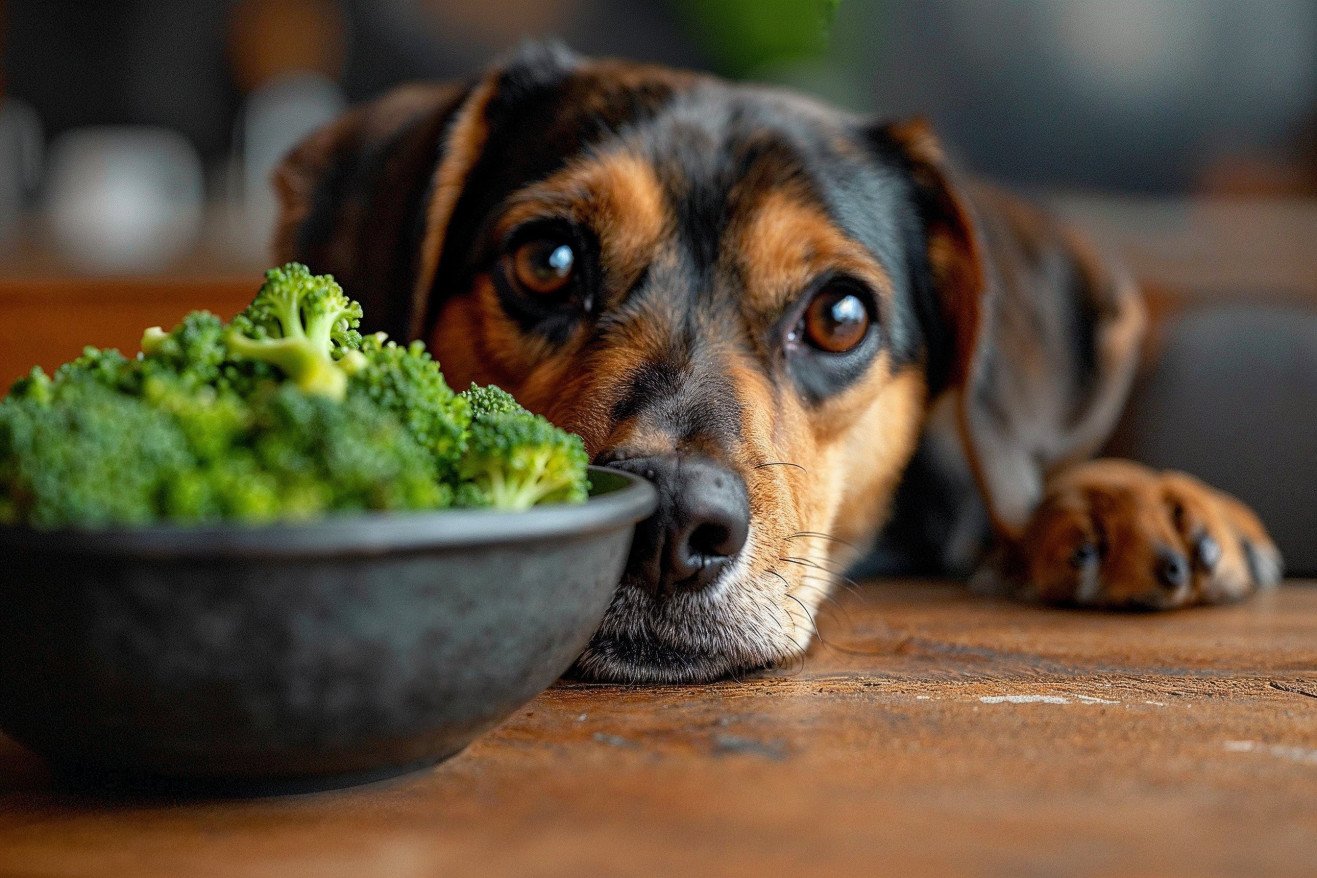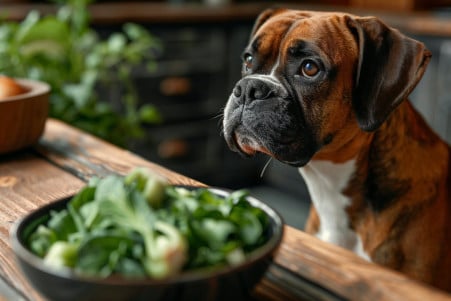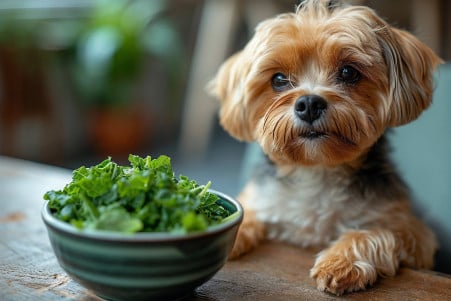Can Dogs Eat Broccoli? Nutritional Guidelines for Your Pet
23 January 2024 • Updated 28 January 2024

Broccoli is often hailed as a superfood for people, but can it be a healthy snack for your four-legged friend? The good news is that dogs can eat broccoli in moderation, and it can be a good source of fiber and vitamins.
However, it’s important to make sure that no more than 10% of your dog’s daily diet consists of broccoli to avoid potential gastrointestinal problems. Broccoli should also be served in small, bite-sized pieces and without any added seasonings.
This article will provide a detailed overview of dog nutrition, using information from veterinary professionals and animal nutrition research to explain how broccoli can fit into a dog’s diet. We’ll cover the nutritional value of broccoli, how much broccoli dogs can eat, and potential downsides to help you understand the role that broccoli can play in your dog’s overall nutrition.
Our goal is to give you the information you need to make evidence-based decisions about your dog’s diet.
Can dogs eat broccoli?
Broccoli’s Nutritional Profile for Dogs
While broccoli isn’t a superfood for dogs like it is for humans, it does have a number of nutrients that can be good for dogs. Broccoli is high in vitamins C and K, potassium, and fiber, all of which can help support a dog’s heart health, bone health, and immune system.
According to Rover, broccoli is a healthy addition to a dog’s diet as a treat because it’s low in fat and sugar and high in dietary fiber and vitamin C.
Dogs Naturally Magazine explains that the antioxidants in broccoli, like sulforaphane, can help reduce oxidative stress, which is a leading cause of many chronic diseases.
At just 24 kcal per 100g, as reported by Raw Bistro, broccoli is also a good choice for dogs who need to lose weight. The fiber in broccoli helps with digestion and makes dogs feel full without adding extra calories. The protein in broccoli is also higher than in many other vegetables, which can help support muscle health and repair.
Despite its many benefits, broccoli is best used as an occasional treat rather than a regular part of a dog’s diet. Some of the nutrients in broccoli, such as vitamin C and potassium, can be beneficial to dogs when they’re consumed in the right amounts.
While it’s important to recognize the benefits of feeding broccoli to dogs, it’s also important to know how to feed it to them safely so that they can enjoy the benefits without any of the drawbacks.
Broccoli on the Doggy Dinner Table: How Much and How to Serve
As with any new food, it’s important to feed your dog broccoli in moderation. According to James Wellbeloved, the recommended amount of broccoli should be no more than 10% of your dog’s daily calorie intake. For larger dogs, this may be a few florets, while smaller dogs may only need a small piece to avoid the risk of isothiocyanate toxicity. To avoid choking and help with digestion, Petfinder recommends cutting broccoli into small, bite-sized pieces.
How you prepare the broccoli is just as important as how much you give your dog. To make it easier for dogs to digest, Rogue Pet Science recommends steaming or boiling broccoli with no added seasonings. Cooking the broccoli also helps break down the fibrous stalks, which can help prevent gastrointestinal blockages.
When you first introduce broccoli to your dog, do so slowly. Give them a small amount and see how they react. Some dogs may experience gas or an upset stomach, especially if they’re not used to eating a lot of fiber.
This is because fiber-rich foods like broccoli can cause these symptoms if they’re introduced too quickly. It’s important to watch your dog closely after they eat broccoli to make sure they’re okay. Keep an eye out for signs of digestive upset or an allergic reaction, and if you notice anything concerning, contact your vet.
By paying close attention to how your dog reacts, you can make sure this healthy veggie is helping them without causing any problems.
Risks: Broccoli and Dog Digestion
While there are many benefits to feeding your dog broccoli, there are also some risks. One of the most important is the presence of isothiocyanates, which are found in cruciferous vegetables like broccoli.
According to PetMD, isothiocyanates can potentially cause gastric irritation in dogs. While isothiocyanate toxicity can occur if a dog eats a large amount of broccoli, it is rare.
According to Daily Paws, signs of gastric irritation in dogs that have eaten broccoli can include gas, diarrhea, and vomiting. It’s important to note that these symptoms can also be a sign of food intolerance, which can happen even if your dog has never eaten broccoli before.
If you notice any of these symptoms in your dog, it’s important to act quickly. PetMD says that you should stop feeding your dog broccoli and monitor them for any other symptoms.
If your dog shows any other symptoms, such as a loss of appetite, vomiting, excessive diarrhea, or signs of pain, you should contact your vet immediately.
By being observant when you introduce new foods to your dog and knowing when to get help, you can prevent minor issues from becoming major health problems. As we think about these risks, it’s also important to think about how broccoli can be part of a well-rounded dog diet.
Broccoli: A Healthy Snack in a Dog’s Diverse Diet
According to VCA Animal Hospitals, a healthy dog diet should include a mix of animal and plant-based foods to ensure that all of their nutritional needs are met. In this context, vegetables like broccoli provide vitamins, minerals, and fiber to a dog’s diet and are therefore considered a supplement.
Make sure that you’re supplementing your dog’s diet with broccoli in a way that doesn’t throw off their overall nutritional balance by giving them the occasional treat that’s portioned out based on their size and caloric needs.
PetMD emphasizes the importance of a diverse diet for a dog’s overall health and well-being. Broccoli can be part of that diverse diet because it’s low in calories and high in nutrients.
However, it’s important to consider life-stage differences. For example, the ASPCA explains that puppies need more energy and protein, so they can benefit from the nutrients in broccoli without the extra calories that come with it.
Make sure that you’re giving broccoli to adult and senior dogs in moderation, as their metabolisms and digestive systems may be more delicate, to make sure that it’s helping their diet without causing any digestive issues.
When you’re adding broccoli to a dog’s diet, make sure that you’re considering these life-stage nutritional needs so that dogs of all ages can benefit from this nutritious green vegetable in a safe way.
Can Cruciferous Vegetables Help Dogs?
While cruciferous vegetables are often praised for their health benefits in humans, can they help our dogs too? In addition to broccoli, cauliflower and Brussels sprouts have similar nutritional profiles that are high in fiber, vitamins, and antioxidants that can help dogs. However, they should still only be a small part of a dog’s diet because they can cause problems like gastrointestinal upset if eaten in large amounts.
One study published in PubMed looked at vegetable intake and the risk of transitional cell carcinoma in Scottish Terriers and found that there was an inverse relationship between vegetable intake and the risk of developing TCC. While the study didn’t find that cruciferous vegetables in particular were associated with a significant reduction in risk, it did find that vegetables in general may help protect dogs from certain types of cancer.
Petfood Industry also looked at the role of cruciferous vegetables like kale and broccoli in the diets of dogs and cats and found that while they aren’t necessary, they can be beneficial when included in the right amounts. Because they are so nutrient-dense, they can be helpful for specific health issues.
For pet parents, it’s important to weigh the pros and cons. Including a variety of vegetables, including cruciferous vegetables, in small, appropriate amounts can help improve our pets’ health while minimizing the potential downsides.
The Bottom Line: Can Dogs Eat Broccoli?
In conclusion, broccoli can be a healthy treat for dogs if it is fed in the right amounts and prepared properly. It is a good source of fiber, vitamins, and antioxidants that can be good for your dog.
However, as both Hill’s Pet and PetMD point out, the key is to feed it in moderation. Broccoli should make up no more than 10% of a dog’s diet to avoid problems like stomach upset and isothiocyanate toxicity.
Cut broccoli into small, bite-sized pieces and feed it raw or cooked to reduce the risk of choking and make it easier to digest. However, make sure it is prepared properly.
As Purina notes, it’s important to wash broccoli thoroughly to avoid bacterial contamination. And, of course, it’s important to consult with a vet, especially before making any changes to your dog’s diet or if you notice any signs of a bad reaction after feeding them a new food.
Finally, it’s important to remember that while broccoli can be a healthy addition to a dog’s diet, it should not be used as a substitute for a nutritionally complete, species-appropriate diet.
A diet that meets all of your dog’s nutritional needs is the most important factor in their health and well-being. Always consult with a vet to make sure that the treats you feed your dog, including broccoli, are not only safe but also healthy for them.


